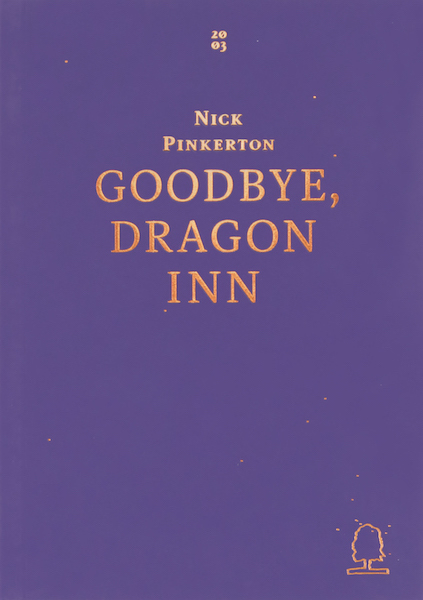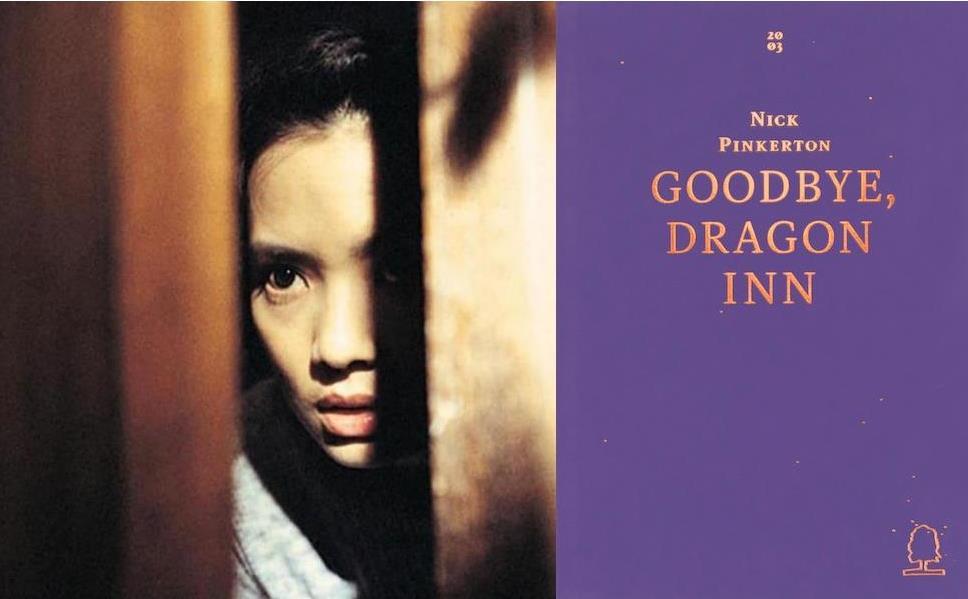Fireflies began as a magazine in 2014. It’s the brainchild of Berlin-based Giovanni Marchini Camia and Melbourne-based Annabel Brady-Brown. Like a handful of other publications (Found Footage, Nang, La vida útil, Apaches) in the independent film and criticism scene across the globe, Fireflies walks a brave path by remaining a material, printed object, using its online page only for promotion and sales.
As someone who lived through the experience of small-press publishing in the latter decades of the 20th century – and who still heaves multiple, unsold copies of certain magnificent tomes circa 1985 onto my bookshelves – I harbour no lingering nostalgia for print-on-paper. Between schlepping boxes of minority-interest material to indifferent distributors, and whacking a piece online instantly for an international audience, there is – for me, at least – no contest. Look at it in strictly economic terms: writing for the Internet may never make any intellectual film critic wealthy, but self-publishing a handsome-looking book on the movies of Hou Hsiao-hsien is sure to put you in debt. Believe me!
Yet there’s another way of looking at this situation – especially if one can somehow manage to offset monetary catastrophe. In a 2019 article for the art magazine Frieze, British critic-scholar Erika Balsom stood up for these modest magazines that ‘find freedom in their niche remits and restricted circulation … bucking criticism’s usual temporality and mode of address to stake out a different relationship between cinema, writing and reading’. Such publications, she argues, ‘insist on materiality as a mean of imparting an experience to the writer and reader that breaks with everyday norms and amplifies appreciation’. She plaintively adds: ‘Besides, what’s wrong with a beautiful book?’
Read: Fireflies Press is a labour of love and cinephilia
Balsom is among the illustrious writers involved with the new Fireflies book project, ‘Decadent Editions’. Ten titles will appear, each devoted to a major film from the first decade of the 2000s. They are affordably priced, all text, with no images. The first cab off the rank is Nick Pinkerton on Tsai Ming-liang’s Goodbye, Dragon Inn (2003), soon to be followed in June by Balsom on James Benning’s Ten Skies (2004). Also announced is Dennis Lim on Hong Sang-soo’s Tale of Cinema (2005), Melissa Anderson on David Lynch’s Inland Empire (2006), and Australian critic Rebecca Harkins-Cross on Lucrecia Martel’s The Headless Woman (2008). It’s an exciting prospect, particularly at this moment when ‘pop’ or coffee-table books on film seem to be dumbing down, while academic books raise their prices beyond the reach of most individuals, aiming only for university library purchase.
It’s an exciting prospect, particularly at this moment when ‘pop’ or coffee-table books on film seem to be dumbing down, while academic books raise their prices beyond the reach of most individuals…
Looking at those author names and film titles, one can get a good sense of the cultural space that Brady-Brown and Marchini Camia are both informed by and aiming for. The list reads like the contents page of a typical issue of the Canadian magazine Cinema Scope, mixed with elements of American online publications like Reverse Shot or 4Columns – with a welcome Aussie ingredient added (ACMI is the official Publishing Partner of Fireflies Press in this venture, and is supporting the series with events and screenings). The books, like the Fireflies magazine issues, are pitched primarily at the cosmopolitan, festival-going, MUBI-watching, art-aware, cinephile-literate audience already hip to the importance of a experimentalist like Benning or a minimalist like Hong. One thing I especially admire: the writers are not obligated to deal with films from the country of their birth – a heinous practice that curses most critics who are not American, French or British to eternal cameo status as ‘native reporters’ in the world’s major cinema magazines.
The inaugural volume on Goodbye, Dragon Inn is an immediately striking object: purple cover with orange foil lettering, small enough to fit comfortably in one’s hand. It is, indeed, beautifully produced. The chosen film happens to be one that I love: Tsai Ming-liang’s ode to a fast-vanishing mode of popular movie consumption takes place in a near-empty Taipei picture theatre in which a wonderful wuxia pian (‘martial chivalry’) epic is screening – while various customers cruise the seemingly labyrinthine corridors for casual sexual encounters. No summary description of this seemingly bare-bones film can quite convey the tension that Tsai wrings from the most seemingly mundane interactions, or the humour he can spark from stretching everything to its breaking point.
American Nick Pinkerton is an auspicious choice as author of this first Decadent Edition. A prolific (and sometimes prolix) critic, he currently appears in everything from Sight and Sound to Artforum. His work is smart, witty, highly readable. He is open to the high and low of culture. He has a fancy vocabulary (with much ‘heretofore’ and ‘per’) and achieves moments of great eloquence, as when, in comparing Tsai to his idol François Truffaut, he remarks: ‘The more aquatically inclined Taiwanese director imagines films not as – to borrow from Truffaut – trains passing in the night, but as monstrous frigates, unmoored and adrift, which carry their human cargo on a dark free-float’. He is also unafraid to be polemical and to pick fights, as he did when Film Comment approached what seemed to be its imminent snuff-out at the hands of New York’s Lincoln Center management. (The magazine has more recently shown tentative signs of resurrection.)
For my money, Pinkerton’s work can also be seen as a symptom – both positive and negative – of where film criticism is, and what it’s doing, right now.
For my money, Pinkerton’s work can also be seen as a symptom – both positive and negative – of where film criticism is, and what it’s doing, right now. I firmly believe that online reading habits have transformed writing – of every kind – in the 21st century. The common practice that every computer user engages in – starting to read a piece, following links that are detours or digressions, learning about something related or unrelated, then eventually returning to the initial text – have seemingly moulded not only the way we consume and think, but also the way we choose to write. Long after the 1990s experiments with digital ‘hypertext’ writing – a field in which the late Adrian Miles at RMIT was a pioneer – have faded away, the principle of that genre lives on.
Digressions and detours have now become an integral part of writing, in fiction and non-fiction alike. In a sense, it is a process of ‘free association’. We ‘open another window’ in our prose and spend some time there before winding back to the first stream of thought. Except that this is, most of the time, not laid out like some jazzy, avant-garde collage, as innovators in 20th century writing played that game. Digressive writing, today, is arranged like any ordinary, journalistic writing, paragraph after paragraph after paragraph … with very little of the constant interweaving and systematic compression of key themes and motifs that characterises great essayists such as Meaghan Morris or Lesley Stern.
Read: Wong Kar Wai’s school for cool
I hate the omnipresent journalistic appeal to ‘generational’ attitudes and habits but, in my own case, I do hold on to a few pearls of writing wisdom that I picked up in pre-Internet days. In the mid ‘80s, a tough literary editor showed me his own writing process. Yanking out a long trail of paper from his printer (he was an early computer user, using a machine that did not yet separate the pages), he declared: ‘Look, I had a sudden idea a little to the side of my main topic. I thought about it, explored it, re-read a few books on it, wrote about it intensely for a whole week. Four pages – brilliant stuff! And here’s what it became’. Then he reached for the latest draft of his essay-in-process on the desk. The four pages had been condensed to four lines, just a quick, loaded deviation. He concluded: ‘Writing’s all about keeping the rhythm of the thing as it unfolds and evolves – and holding the attention of the reader’.
It was the same lesson frequently delivered, less gruffly, by the venerated screenwriter Jean-Claude Carrière, who recently passed away. If you’re writing a story, he counselled, allow yourself the freedom, the space and time, to go off on tangents. Research, down to the most minute detail, anything that figures in your narrative or its world – say, the construction of stringed musical instruments in the 17th century. You’ll learn something, and that knowledge may come in handy at some other point of your life. But be ready, ultimately, to have those weeks or months of research boil down to a single line in your finished script. Even if the film’s viewers don’t consciously realise it, they will feel the depth and authenticity of that single line. It’s what Old Hollywood filmmakers called the Iceberg Effect: only a small part of one’s labour is visible above the surface, but the larger, deeper, subterranean part can be intuited, and that guarantees (in the best instances) its value and worth.
There is not much Iceberg Effect in a lot of contemporary writing. I do not think (as some do) that this primarily comes down to a lack of editing of the part of publishers. It is more a question of the prevalent mindset adopted by a great many writers today. Pinkerton is a prime example. He writes in necessarily varied formats, but the heart and soul of his output is showcased on the Substack site, Employee Picks. A typical essay there – such as his appropriately titled ‘Collect ‘em All!’ posted on 1 March 2021 – runs to almost 18,000 words. It’s the kind of never-ending story Pinkerton frequently writes – potentially infinite in its extension since, for every key name, title, movement or trend mentioned, he will immediately devote a paragraph or four to it.
One recognises, when reading Pinkerton, the immense labour of his rhizomatic research. There’s a giddy effect of scanning multiple bases of culture and thought. But that can also amount to, at moments, a weightless, superficial glide – and a wilful refusal to boil anything down into a tight form.
In his book on Goodbye, Dragon Inn there is, at least, the structure of chapter divisions, which serves the digressive method well. Taking each item in turn, Pinkerton free-associates from particular elements embedded in Tsai’s film: gay porn, Taiwanese history, Chinese pop music, King Hu’s Dragon Inn (1967), the Taiwanese New Wave of the ‘80s, Buddhist philosophy, the place of the old-style picture theatre in a swiftly changing cultural landscape … as well as other, closely related movies made by this director. It’s a bit scattershot, but always interesting and well expressed.
An overarching theme does emerge: the questions of change and evolution, death and rebirth, particularly as they pertain to the definition of cinema itself, and our experience of it. Tsai is an optimist on this point; he has merrily adopted digital filming, art gallery installations, and even a big-budget virtual reality project. Pinkerton is more troubled and reflective; just when I expected him to pull out a closing, epiphanic quotation from Joni Mitchell’s ‘The Circle Game’, he does a swiftie and references Hüsker Dü instead: ‘Something happened way too quick …’.
The Decadent Editions series announces that it intends to cover films that are ‘each a milestone of contemporary cinema’. Pinkerton raises this bet on his first page: Goodbye, Dragon Inn is, in his estimation, ‘a key text of 21st-century moving image-based art’. But does his book, in the digressive way he has composed it, entirely convince us of this claim? It is fundamentally impossible to prove to anybody that a movie is objectively good, let alone great – the judgment of art doesn’t work that way. But any writer enamoured of a film will at least try to convey a sense of its fullness, richness and depth.
For a book that covers so much ground so enthusiastically, I felt by the end that Goodbye, Dragon Inn itself, what makes it most enjoyable and invigorating as a film, had gotten a little lost by the wayside. Maybe Pinkerton wanted to avoid rehashing the now decades-long discussion of Tsai’s cinematic style, with its long takes and tense, static frames. Even the extraordinary physicality of Tsai’s work – its performance-art-like attention to bodily movement, posture and gesture – tends to get mulched into Pinkerton’s rather melancholic view of human ageing as gradual disintegration, thus mirroring the demise of the celluloid cinema medium.
But Tsai’s films, for all their gazing at hard truths, never become collective sob-sessions; on the contrary, they are utterly exhilarating for anyone who can tune into their play with time and space, light and colour, incident and trajectory. The Tsai Ming-liang who is at once a devout Buddhist and a gay porn aficionado bears a phantom, Cheshire Cat-like smile that effortlessly evades the worst prognosis of the film medium’s extinction – even after a year of pandemic, which is where Pinkerton begins his tale of cinema. His book is not quite ‘all context and no text’, but I hoped for a sweeter rendezvous between the materiality of the printed page and the materiality of a sublime film.
|
3 stars
|
★★★
|
GOODBYE, DRAGON INN by Nick Pinkerton
Publisher: Fireflies Press
ISBN: 978-3-9819186-7-0
Format: Paperback, 240 pages
Categories: Cinema, Film Criticism
Release Date: March 2021

Actors:
Director:
Format:
Country:
Release:





